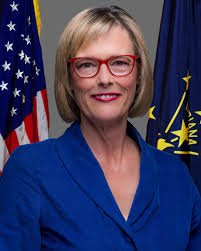
Betty’s advocacy helped the Indiana General Assembly pass legislation in 2017. This created a 17 person task force, which I had the honor of chairing and serving alongside Betty. Our purpose was a direct one, assess current supports and services for people with intellectual and developmental disabilities and come up with a plan to make them better. We recently concluded our meetings and delivered our report outlining the goals and recommendations on how to best serve those with an intellectual and developmental disability to the general assembly.
The task force took their job seriously and we traveled the entire state to hear from families, providers and people with disabilities to learn what was most important to them. Over the last year we met 10 times in places from Boonville to Valparaiso and New Albany to Columbia City. Each meeting, we tried to visit providers that delivered important services to people with disabilities to see firsthand what services and supports were being accessed. At our meetings, we took public comment from more than 100 self-advocates with intellectual and developmental disabilities, 60 family members, advocacy organizations, numerous staff from 26 service providers and state government agencies on how we could fix some of the gaps in how we are helping these individuals.
I learned it is imperative we continue to evolve the services and supports for people with intellectual and developmental disabilities. People want choices in the type of services they receive and where they receive them. I am constantly inspired by the work of our service providers in our state. They are trying to stay fresh with ideas, some offer art and others run coffee shops. I always walk away feeling proud in how they provide services and how they access the individuals’ talents.
As the task force worked on our report, we relied on data to better understand and evaluate community-based services. This helped focus on the cost, utilization and services of the existing programs and how we could improve. Our report highlights four goals: prioritize community settings and individualized approaches, advance and maximize community and state resources and programs to be inclusive to all Hoosiers, respond to individual and family needs and include a wide array of supports and services that are sustainable, equitable and available across all communities. To read the report in its entirety, visit www.in.gov/fssa/files/1102_final_report_11.1.2018.pdf.
As our work came to an end, I continued to think about my friend, Betty. She became ill this past June and was unable to attend the last few meetings of the task force. I know her wishes were carried through by the other members and I think she would be proud of our final report. Betty passed away just a few weeks ago, but her advocacy and spirit is heard throughout the final report. She taught us to be bold, and stand up for those who need help, and I hope the Indiana General Assembly enacts the recommendations from the task force this legislative session.
I am proud that Indiana has a strong history of helping Hoosiers with intellectual and developmental disabilities through community-based services and supports across their lifespan, rather than relying on state operated facilities to serve them. If we truly want to take our state to the Next Level, we must continue to invest in, and improve upon, these services and meet the needs of the individuals, their families and the community-based organizations.



